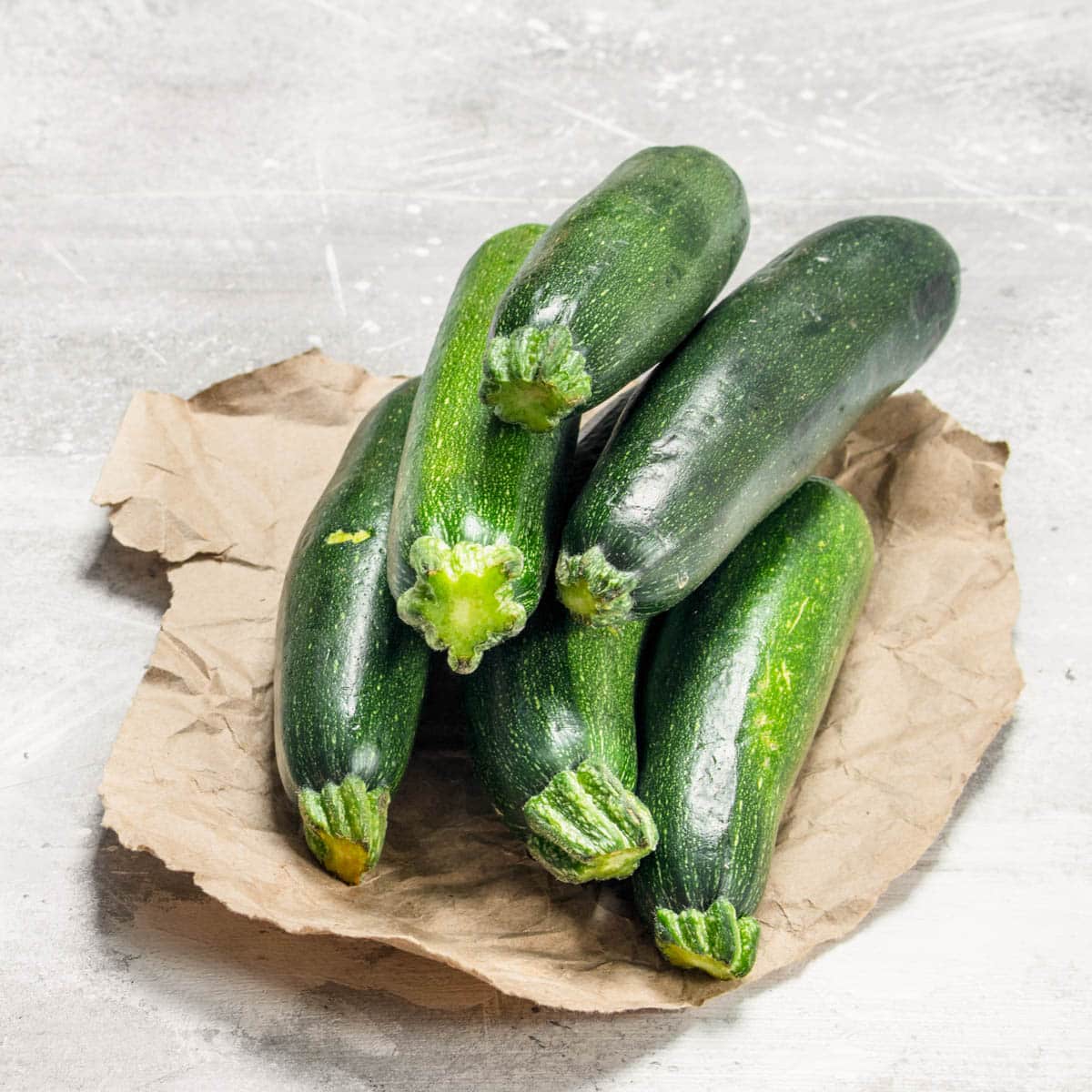How To Store Zucchini
In the world of home cooking, few vegetables are as versatile as the zucchini. Not only is it a dietary powerhouse, but it’s also a flexible ingredient that can fit into almost any dish.
However, if you’re like me, you’ve probably faced the common dilemma of how to store zucchini to keep it fresh for as long as possible.
Today, we’re diving deep into the best ways to store zucchini, whether you’re looking to keep it on the counter, in the fridge, or even in the freezer.
How to store zucchini
To store zucchini, keep it unwashed in a perforated plastic bag in the fridge’s vegetable drawer. For longer storage, freeze zucchini by washing, slicing, and blanching for 2 minutes, cooling in ice water, drying, then freezing flat on a tray before transferring it to a freezer-safe bag.

Storing zucchini properly ensures you can enjoy its mild flavor and health benefits anytime you want. The key to proper storage is understanding the different options available to you and how each one affects the zucchini’s freshness and nutritional value.
The three main methods are on the counter, in the fridge, and in the freezer.
In the fridge
Storing zucchini in the fridge is arguably the most common method, and it’s incredibly simple.
For the best results, place your fresh zucchini in a plastic bag, but don’t seal it completely – you want to allow a little airflow.
Then, just pop it in the vegetable drawer of your fridge. This method should keep your zucchini fresh for about 1-2 weeks.
In the freezer
Freezing zucchini is a fantastic option if you’re looking to preserve it for longer periods. First, wash and slice the zucchini.
Blanch the slices in boiling water for 2 minutes, then immediately transfer them to ice water to stop the cooking process.
After drying the slices, spread them out on a baking sheet and freeze. Once they’re frozen, transfer the slices to a freezer-safe bag or container.
They can be kept in the freezer for up to 9-12 months. Learn the steps of how to freeze zucchini in my guided post to ensure that your zucchini will be frozen correctly.
On the counter
While not as long-lasting as the other methods, storing zucchini on the counter is perfectly acceptable if you’re planning to use it within a couple of days.
Keep your zucchini in a cool, dark place away from direct sunlight. Be careful not to store it next to fruits like bananas or apples, as these emit ethylene gas that can hasten the zucchini’s ripening process.
When it comes to storing zucchini, it’s important to know the right storage techniques to maintain its freshness.
For a comprehensive guide on storing various types of vegetables, including zucchini, you can refer to our article on how to store vegetables.
It offers valuable insights on temperature, humidity, and ethylene sensitivity to help you keep your zucchini and other vegetables fresh and delicious for longer.
What are the benefits of freezing zucchini?
One of the main advantages of freezing zucchini is its extended shelf-life. Moreover, freezing maintains most of the zucchini’s nutritional value, which includes essential vitamins, minerals, and fiber.
It also offers convenience. With frozen zucchini, you always have a ready-to-cook ingredient for your meals, whether it’s for a soup, stir-fry, or a comforting bake.
What is the best way to wash zucchini?
Keeping zucchini clean is an important part of maintaining its freshness. The best way to wash zucchini is under cool running water while gently scrubbing its skin with a vegetable brush.
This method ensures you remove any dirt or residues. Remember to wash zucchini just before you’re ready to use it, as washing before storage can lead to premature spoilage.
How long does fresh zucchini last?
Fresh zucchini, when stored properly, can last up to 1-2 weeks in the fridge. This is best achieved by keeping it unwashed and loosely wrapped in a perforated plastic bag in your refrigerator’s crisper drawer.
The cool temperature slows down the aging process, extending its shelf life.
On the counter, however, zucchini should ideally be used within 2-3 days. Room temperature conditions tend to accelerate the ripening and aging process, so it’s a good strategy if you plan on using the zucchini in your meals soon.
Remember, these are just standard guidelines, and the exact lifespan may vary depending on the initial freshness of your zucchini.
Regularly checking your zucchini is key to ensuring you’re using a fresh, quality ingredient. Signs of spoilage include a change in color to a dull or yellowish hue, a soft or slimy texture, and a foul or unusually strong smell.
In addition, if you’ve cut the zucchini, be sure to use it even sooner, as once cut, it becomes more susceptible to bacteria and spoils faster.
Store cut zucchini in a sealed container in the refrigerator to maintain its freshness for a couple of days. Always prioritize safety when deciding whether to use or discard your stored zucchini.
More food storage tips
Frequently asked questions about how to store zucchini
Conclusion
Knowing how to store zucchini properly is an invaluable skill. It not only maximizes the vegetable’s freshness and nutritional value, but it also reduces waste and saves money.
So whether you’re storing zucchini on the counter, in the fridge, or in the freezer, these tips will ensure you have this versatile vegetable ready for your next delicious creation.

Online Cooking for Beginners Course